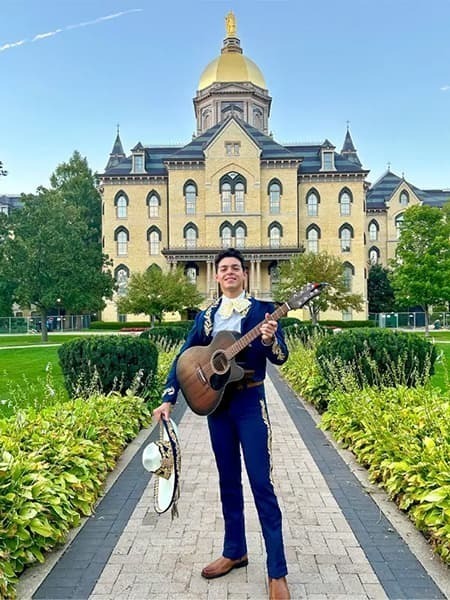Research and Representation: Senior Alan Avalos finds his passion for neuroscience and for advocacy.

Looking back at senior Alan Avalos’ accomplishments, it’s hard to imagine him ever experiencing imposter syndrome.
Avalos, a neuroscience and behavior and Latino studies major, works as a research assistant in the Smith Lab, where he studies sensorimotor circuitry in the spinal cord and is the lead author on a forthcoming research paper.
During his time at Notre Dame, he has also served as president of the Latinx Student Alliance and on the advisory board of the First Gen Careers Initiative, performed with Mariachi ND, and volunteered at La Casa de Amistad in South Bend.
But in his first days on campus, Avalos struggled with the idea that perhaps he wouldn’t be up to the challenges he might face at a research university like Notre Dame.
The community he found here helped him overcome that mindset and showed him that Notre Dame was exactly where he belonged.
Avalos and his family came to the US from Michoacán, Mexico, when he was 13, and he began eighth grade in Glen Ellyn, Illinois, knowing only a sentence or two of English.
Five years later, he had mastered the language and his high school coursework and was admitted to Notre Dame through the QuestBridge Program. Avalos said he was drawn to the University, in part, because it allowed him to stay close to his family in the Chicago suburbs.
“Family is really important to me and was one of the big things driving my college decision,” he said. “I didn’t know much about Notre Dame at first, except that it was close to home. But the more I researched it, the more excited I got. The community aspect of it was unlike any other school I was looking into. And when I came to campus for the first time to move in, my parents and I were amazed at how beautiful everything was.”
Over the next four years, Avalos found that the people he has encountered at Notre Dame have become a second family to him, offering him mentorship and support—particularly through the AnBryce Scholars Initiative for first-generation students, the Galvin Scholars Program, and the Institute for Latino Studies.
Read Alan's full story at nd.edu/commencement-2024
Originally published by at al.nd.edu on May 15, 2024.
Latest Research
- From reaction to resolution: The future of allergy treatmentTwelve-year-old Lauren Eglite was thrilled to attend a Notre Dame football game with her father, Erik, in 2017, even though her acute peanut allergy demands constant vigilance. She was even more excited when the stadium’s brand-new video board aired an NBC Fighting…
- New Study Highlights Mother-Child Link for Anemia in The GambiaAnemia is a "silent epidemic." It affects nearly 2 billion people globally, yet many people ignore its symptoms. Typically caused by the consumption of iron-deficient foods, anemia develops gradually. Its symptoms—such as fatigue, weakness, and shortness of breath—are frequently dismissed or misattributed.
- Megan McDermott joins ND–IBM Tech Ethics Lab as new Notre Dame directorThe Notre Dame–IBM Technology Ethics Lab, a critical component of the Institute for Ethics and the Common Good (ECG) and the Notre…
- Jenkins Center for Virtue Ethics receives grant to advance love-based ethical frameworkThe University of Notre Dame has received a $10 million grant from the John Templeton Foundation to support a project titled Love and Social Transformation: Empowering Scholars and Social Innovators to Develop the Love Ethic.
- ND-GAIN releases latest Country Index updateThe lastest update to the University of Notre Dame’s Global Adaptation Initiative's (ND-GAIN) Country Index is now live. The ND-GAIN team will release a second Country Index update in late Fall, which includes…
- In sub-Saharan Africa, 1 in 6 cancer medications found to be defectiveSerious quality defects were found in a significant number of cancer medications from sub-Saharan Africa, according to new research from the University of Notre Dame.












